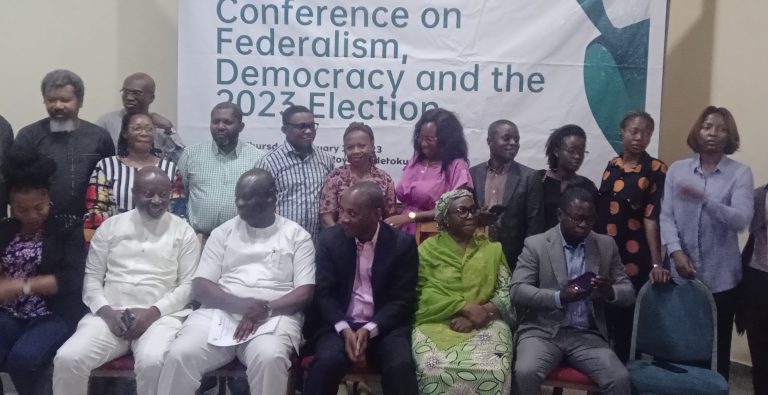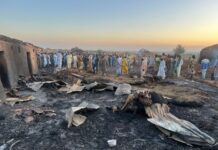By Angela Atabo
African Centre for Media and Information Literacy (AFRICMIL) has urged Nigerians to use the 2023 election to create a new vision for nationhood and citizenship.
Dr Chido Onumah, the Coordinator, AFRICMIL said this at a Pre-election Conference on Democracy, Federalism and the 2023 Election organisered by the Centre with support from Social Development Integrated Centre (SocialAction)in Abuja on Thursday.
Onumah said recent calls for a return to an undefined ‘true Federalism ‘has complexified the ongoing national debate in the context of federalism as an ideology ,a political system of form of government.
“As we heard into a very important election in one week ,these questions are begging for answers.
“It is against this backdrop that this conference provides space for serious and constructive dialogue from scholars, thought leaders ,youths, workers ,politicians and social activists to make contributions relevant to promoting emancipatory and progressive perspectives on democracy, federalism and nation-building in Nigeria.
“We hope that at the end of this conference we would be able to shape the conversation in the run-up to the General Elections, redefine a new vision of nationhood and citizenship,” he said.
Onumah said the conference would also help to define concrete options for federalism and nation-building including resource control, protecting citizens and residency of all people regardless of wherever they select to call home.
He said it would also identify possibilities for advancing a national vision through collective engagement with the mainstream political parties ahead of the elections.
Dr Sam Amadi, the Director, Abuja School of Social and Political Thoughts ,said that so far the system had not carried Nigerians along in terms of having a say in governance.
Amadi said that over the years, the focus of politics in Nigeria was made to be about acquisition for self and for group and not for national development and this calls for change to people centred governance.
“The problem is that you have not developed a politics that is nationalistic that is focused on the country as one entity so people in power see power as a way to win the economic power for selfish or group interest.
“It is important for Nigerians to develop courage to think of ways to do things differently to tackle the root cause of the national problem and develop political will to proffer lasting solutions.
“This can be through political organisation to deepen engagement on tackling issues as we are seeing in this electoral process , people need to always ask the right questions, take courage, organise and put in authority persons who think like they do,” he said.
Amadi said that citizens needed to elect peopele who understood the challenges facing the nation and were willing to do something to solve the problem.
“So there is no way you can run from politics, you have to organise, win power, and push the ideas that can change the country. I think that’s the way forward for Nigeria.”
A Policy Analyst , Hauwa Mustapha , said it was important to invest in people because democracy was about the people and about participation.
According to Mustapha, democracy is about people taking control of their destiny , managing the resources and being part of the decision making about things that affects their lives.
“So if that is what democracy is about, then we must invest in people’s empowerment, people need to be aware and have access to information as well as access to participatory democracy.
“How issues are debated, how programmes are developed, how resources are shared how governance is done, the people have to be part of it.
“Once people are part of the process of governance, then you deepen democracy, then you you reduce the friction and conflicts in the society because conflicts occur largely because people are in disagreements of happenings around them.”
Mustapha said that people were usually not comfortable with policies and programmes they felt excluded from.
She however ,said that once they were part of decision making process, even if things went wrong, they would take a collectively blame and decide how to fix it but once they were not part of the process and things went wrong it could result in anger and conflict.(NAN)




